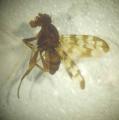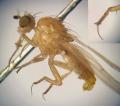Diptera.info :: Identification queries :: Diptera (adults)
|
Insectes "pyrophiles"
|
|
| cthirion |
Posted on 22-08-2004 23:19
|
|
Member Location: Awirs (Flémalle) Belgique Posts: 901 Joined: 13.08.04 |
What,from turf-moor in East Belgium! Empididae? Fly flying in cloud above turf-moor after fire. 
cthirion |
| Paul Beuk |
Posted on 23-08-2004 08:03
|
|
Super Administrator Location: Netherlands Posts: 19403 Joined: 11.05.04 |
Apparently there is a dance fly that can hunt the swarms of Microsania in smoke. That fly is Hormopeza obliterata and from the picture it may well be this species. I will check and get back if I find out it is anything else. Microsania is a genus of small flies (family Platypezidae) that are known as 'smoke flies' because the are attracted to smoke and larvae may live in or near burnt wood. Paul - - - - Paul Beuk on https://diptera.info |
| cthirion |
Posted on 24-08-2004 10:50
|
|
Member Location: Awirs (Flémalle) Belgique Posts: 901 Joined: 13.08.04 |
Thank you Paul, you are very important also! 
cthirion |
| Paul Beuk |
Posted on 24-08-2004 10:53
|
|
Super Administrator Location: Netherlands Posts: 19403 Joined: 11.05.04 |
Why, thank you! (blush)
Paul - - - - Paul Beuk on https://diptera.info |
| Jan Willem |
Posted on 28-08-2004 15:20
|
|
Member Location: Waalwijk, The Netherlands Posts: 2163 Joined: 24.07.04 |
Hi, As fas as the wing venation can be seen in the picture, it doesn't seem to fit that of Hormopeza obliterata comparing it with Fig. 105 in part II of the Empididae work of Collin! Furthermore, the antennae look entirely different. For me it's impossible though to give you a name of a better fitting species. Maybe Paul can come up with a better identification. Jan Willem |
|
|
|
| Paul Beuk |
Posted on 28-08-2004 15:50
|
|
Super Administrator Location: Netherlands Posts: 19403 Joined: 11.05.04 |
I did not have a second look yet and I cannot deny that you are right. The fly does have a 'hybotid' look and may well belong there. I still hope that the original collector has some specimens left...
Paul - - - - Paul Beuk on https://diptera.info |
| cthirion |
Posted on 31-08-2004 13:56
|
|
Member Location: Awirs (Flémalle) Belgique Posts: 901 Joined: 13.08.04 |
Thank you frm C.Thirion and Jean Fagot!
cthirion |
| Paul Beuk |
Posted on 31-08-2004 14:08
|
|
Super Administrator Location: Netherlands Posts: 19403 Joined: 11.05.04 |
Paul Beuk wrote: I still hope that the original collector has some specimens left... They should be on the way soon and when I have examined them, I will tell you all about it. 
Paul - - - - Paul Beuk on https://diptera.info |
| Kahis |
Posted on 02-09-2004 08:42
|
|
Member Location: Helsinki, Finland Posts: 1999 Joined: 02.09.04 |
Thats a male of Microsania. I dont have the new book on Platypezidae here at home (it's too damn expensive!), but the wing vein figure in Tanasiichuk in Bei-Bienko matches the pic exactly. Jere Edited by Kahis on 02-09-2004 08:43 |
| Paul Beuk |
Posted on 02-09-2004 09:42
|
|
Super Administrator Location: Netherlands Posts: 19403 Joined: 11.05.04 |
Also check out the pictures here: http://www.dipter...read_id=57. The wing venation in the picture above is rather vague and in my view may or may not be Microsania. The other pictures show some characters I would normally associate with Empidoidea. Having seen some poor specimens of Microsania only once, I cannot confirm that it may be that genus. I do not have Chandler's book either...
Paul - - - - Paul Beuk on https://diptera.info |
| Kahis |
Posted on 03-09-2004 08:49
|
|
Member Location: Helsinki, Finland Posts: 1999 Joined: 02.09.04 |
I'm still sure that it is Microsania. Although I have not seen specimens of this genus, the general shape is not too far from (for example) Callomya. Microsania has no outer crossveins and has in general weak venation. The pterostigma around end of Sc-R1 is rather strong and characteristically distally well defined and rounded. What is visible of the male genitalia is also Platypezid-like, not hybotid or empidid. |
| Paul Beuk |
Posted on 04-09-2004 12:13
|
|
Super Administrator Location: Netherlands Posts: 19403 Joined: 11.05.04 |
Okay, I take you point. The sternites are very pale towards the end of the abdomen and I thought the whole abdomen was curved downwards. But rather than the whole abdomen being curved downwards, it is only the genitalia and that would quite nicely fit with the Platypezidae. From the collector I first understood that there were smaller and larger flies in the smoke and that the pictures were of the larger ones. That set me on the wrong track of the Empidoidea. I guess I was not critical enough. I will wait the specimens by mail and let you know. Paul - - - - Paul Beuk on https://diptera.info |
| Jump to Forum: |













